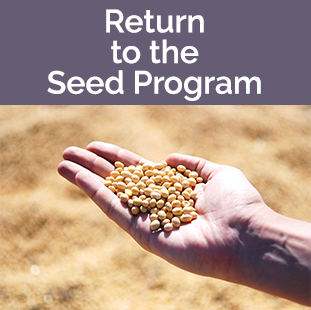Plant Variety Protection Act
The Plant Variety Protection Act was signed into federal law on December 24, 1970. The law allows the developer and owner of a new distinct seed variety to obtain property rights protection if the variety meets certain requirements. The act was amended by Congress in 1994. A Certificate of Protection is valid for 20 years and excludes others from selling, reproducing, importing, exporting or using the protected variety in the production of a hybrid or another variety during this time without the permission of the owner. The owner is responsible for enforcing these rights.
Types of Protection
Plant Variety Protected (PVP)
The developer and owner of the variety have the exclusive right to control the production and marketing of their varieties. The developer and owner of the variety may sell either certified or uncertified seed of the PVP variety. Growers cannot produce or sell seed of a protected variety without the permission of the developer. Growers who acquired the protected variety legally may save seed for use on their own farm, but cannot sell their production for planting purposes without the permission of the PVP variety owner.
Plant Variety Protected – Title V Option
If the developer and owner of the variety elect the PVP Title V option, seed of these varieties must be sold as a class of certified seed. All seed offered for sale that has PVP Title V protection must be certified seed. No common seed sale of these varieties is allowed. Growers who acquire the protected variety with Title V legally have the right to save seed for use on their own farm, but cannot sell their production for planting purposes without permission of the variety owner.
How can seed dealers, seed conditioners, and growers protect themselves from violating the PVP Act?
Seed Dealers
It is the responsibility of the seller of a PVP variety to inform the buyer if the variety is protected. Each container of seed sold should be labeled with a tag indicating the type of protection the variety has been granted. A seed dealer or producer should never buy PVP Title V varieties without evidence that the seed is certified.
Seed Conditioners
Conditioners may be held liable for cleaning seed of PVP varieties intended for sale as seed if the owner's permission is not given. Conditioning should be limited to the amount of seed needed to plant a farmer's own holdings. Conditioners should make everyone for whom they are conditioning seed sign a document or waiver stating the variety of the seed and if the variety is protected; growers should attest that the seed being conditioned will not be sold to others for planting purposes and will be used only on their own farm. If a conditioner suspects illegal sales, they should contact the owner of the protected variety, or they may contact the Montana Department of Agriculture.
Growers
Producers who grow PVP protected varieties may only save enough of their own production for planting purposes on their own farm. No one should ever purchase so-called "brown bagged" seed. If the seller does not provide a label with the seed, that may be an indication that the seed is illegal. Know the varieties you are planting, and know if the varieties are protected. If you suspect someone of selling "brown bagged" seed, contact the owner of the protected variety or the Montana Department of Agriculture.
What role does Montana Department of Agriculture have in PVP Act?
Owners of protected varieties are responsible for enforcing their rights and may seek compensation for up to three times the damages plus court costs and attorney fees on seed sold. Damages also may be sought for crops produced from illegally planted seed. In accordance to Section 80-5-133, Montana Code Annotated, the department may investigate suspected PVP violations and pursue civil penalties. Enforcement and conviction of PVP Act violations is dependent upon solid evidence. The department encourages those who know of PVP Act violations to submit a written complaint to the department.
A list of PVP protected varieties may be obtained from the national Plant Variety Protection website. This site is a resource for checking PVP status. Interested parties should contact the variety owner to verify PVP protection.

